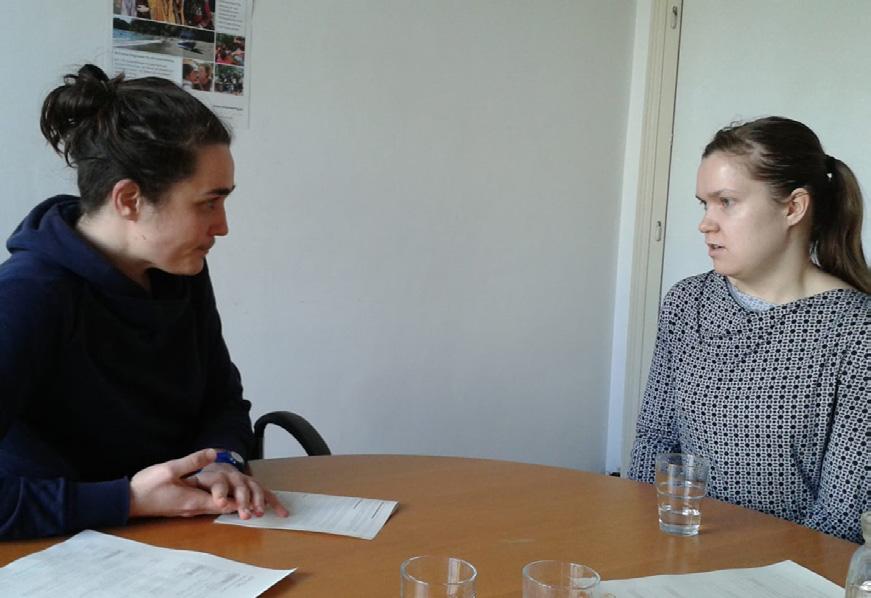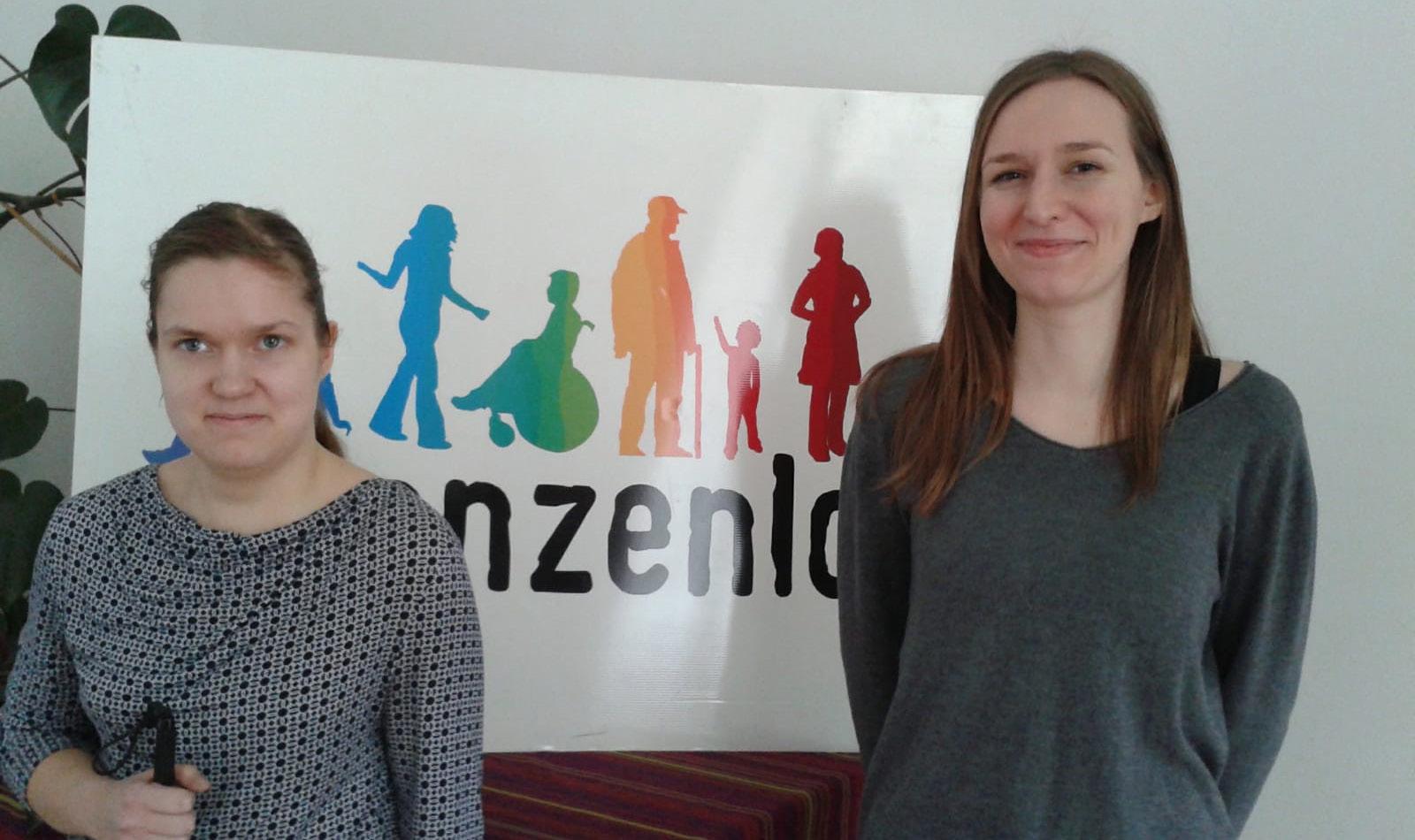
8 minute read
Puoleksi vuodeksi Itävaltaan – näkövammasta huolimatta
Teksti: Susanna Halme, kuva: Anni Koskela
Muistan syksyisen illan, jolloin lojuin sohvalla ja selailin sähköposteja. Vastaan osui viesti, joka oli lähetetty Maailmanvaihdosta Näkövammaisten liittoon, ja sieltä se tavoitti minut. Viestissä puhuttiin puolen vuoden vapaaehtoistyöjaksosta Wienissä. Kiinnostuin heti ja päätin hakea mukaan – ja tulin vieläpä valituksi! Kyseessä on Grenzenlos Without Barriers -hanke, johon osallistun Euroopan solidaarisuusjoukkojen kautta. Lähden Itävaltaan vapaaehtoiseksi toukokuun alussa ja olen siellä puoli vuotta. Työskentelen nuorisovaihtojärjestö Grenzenlosin toimistolla ja asun opiskelija-asuntolan huoneessa. Se, mikä minulle tässä hankkeessa on tärkeintä, on mahdollisuus lähteä ulkomaille itsenäisesti. Jo pidemmän ajan olen halunnut asua vieraassa maassa itsenäisesti. Olen kyllä matkustanut elämässäni paljon, mutta näkövammani takia minulla on aina ollut mukana avustaja. Nyt löytyi mahdollisuus lähteä matkaan ihan yksin ja samalla tehdä jotain hyödyllistä, nimittäin merkityksellistä vapaaehtoistyötä.
Advertisement
Tai no en minä ihan yksin lähde. Otan tietysti mukaan apuvälineistäni tärkeimmän ja rakkaimman – opaskoirani Muusan. Muusa kulkee mukanani kaikkialla opastaen ja kohteita etsien, joten oli selvää, että otan sen mukaan myös Itävaltaan. Vapaaehtoistyöjakson onnistuminen vaatii muitakin tukitoimia ja erityisjärjestelyjä. Luvassa on liikkumistaidonohjausta eli turvallisten reittien opettelua ammattilaisen kanssa (työ-, asiointi- ja harrastusreitit). Henkilökohtaista apua on varattu tarvittava tuntimäärä kuukaudessa, aluksi vähän enemmän, kun kaikki on vielä uutta. Sekä liikkumistaidonohjaaja että henkilökohtainen avustaja järjestyvät Itävallan päästä, eli minun ei itse tarvitse ottaa mukaan omaa avustajaani Suomesta. Tämä on sitä itsenäisyyttä, jota nimenomaan haluan kokea.
Helmikuussa kävimme Maailmanvaihdon pääsihteerin Anni Koskelan kanssa parin päivän tutustumismatkalla Wienissä. Vierailimme tulevassa työpaikassani sekä katsomassa majoitusta. Tutustuimme Grenzenlosin toimiston väkeen ja tapasimme mm. tulevan liikkumistaidonohjaajan. Tutustumismatka oli mielestäni erittäin hyödyllinen ja antoisa. Oli mukavaa tavata ihmiset, joiden kanssa tulen olemaan tekemisissä. Lisäksi oli molemmin puolin hyödyllistä jutella tukitoimista ja erityisjärjes telyistä kasvotusten. Itselleni tuli varmempi olo, että kyllä pärjään ja kaikki kyllä järjestyy. On helpompi luottaa, kun on tavannut ihmiset, jotka asioita järjestelevät.
Toisaalta tutustumismatka myös teki haasteista ja jännityksestä konkreettisempia. Miten ikinä opin kaikki reitit? Miten otan haltuun julkisen liikenteen? Miten opin toimimaan opiskelija-asuntolan yhteiskeittiössä? Miten selviän asioinnista, kodinhoidosta ja muista arjen askareista? Entä jos eksyn? Paljon on siis jännitettävää. Mutta jännitys on positiivista ja motivoivaa. Olen varma, että nämä ovat haasteita, jotka ovat voitettavissa. Ja niiden voittaminen varmasti opettaa paljon. Odotankin innolla sitä, mitä kaikkea voin oppia vapaaehtoistyön ansiosta. Sitä paitsi olen varma, että kun nämä haasteet ratkeavat, tulee todellinen voittajafiilis!
Change starts within the individuals of an organization
Text: Minna Räisänen
Each year, at least one person with disabilities volunteers for six months at the office of Austrian youth exchange organization Grenzenlos. The co-operation is a part of making inclusion an everyday thing, tells Sara Paredes from Grenzenlos.
In 1999, Grenzenlos started working on advancing the mobility of young people with disabilities within the EU supported European Voluntary Service (EVS). A special cooperation with the youth information center in Vienna (wienXtra jugendinfo) and the financial support of the city of Vienna resp. the association wienXtra in the frame of a programme called “Melange”, made it structurally and financially possible to start the process. Courageous and inspired staff of Grenzenlos have taken this idea forward in the last 20 years and created new and more diverse opportunities for people with different abilities in the Grenzenlos programmes. A few years ago EVS developed into the European Solidarity Corps Volunteering (ESC) within which the work now continues. Through Grenzenlos’s ESC project “Grenzenlos without Barriers” young people with disabilities come to volunteer at their office.
Which sorts of arrangements did focusing on young people with disabilities require at the beginning and what does it require today?
Probably the biggest change starts within the individuals in the organization. At the beginning, there are certainly doubts whether we can do it: Can we manage? How much more work will it be? It is natural to be afraid of doing something that you do not have full expertise in. I think that experience, training, being part of accessible projects and the “learning by doing” mentality helped us put that fear aside and stop expecting that we can do everything perfectly or be 100% accessible.

Susanna Halme (left) is the second volunteer to participate in Grenzenlos without barriers through Maailmanvaihto. The volunteering experience begins in May. Samira Baumgartel works in Grenzenlos and met with Susanna during the plan visit in February.
Photo: Anni Koskela
We realized as well that people with disabilities are the experts of their own bodies and capable of expressing their needs. By asking what they need, you will often find out that it is not “much more work” to make the experience possible for people with disabilities. We also work with people with psychological or social issues, and this is sometimes more challenging, as it is hard for them to point out what it is that they exactly need. Communication is the key.
Looking at the beginning and now, we can see, that through our experience and the people we have met Grenzenlos has gained a lot of knowledge and competence in working with volunteers with different abilities. Like this we can support other organisations, who try to expand their target groups in sending as well as in hosting volunteers.
Planning is also crucial. Plan visits in advance are great opportunities for the volunteers to get to know us and vice versa. Good planning also helps us to look for needed support, such as assistants that support people in a wheelchair. It also is very important and useful to have accessible accommodation and city structure.
What has the Grenzenlos without Barriers co-operation given for your organization?
We learn a lot from the volunteers, and we can say that they learn a great deal as well. They are a great support for us, from small jobs like copying documents to changing our working style and the way we present the programs. They also transmit the idea of inclusion to people, so Grenzenlos does not only speak about inclusion but we also get to live it.
It’s hard to pinpoint everything we have learned, and I think every co-worker has learned something different. What we all have learned, though, is that our work should not only be offered to those who think they can do it, but also to those that CAN do it, even if they do not know that this experience is available for them.
Our thinking has changed completely. For us, inclusion is something that we want to see in everything we do and diversity normality or we want it to be. We also want to focus more on the ABILITY part of the word “DisABILITY”. So, our language has changed as well and it keeps changing.
In what other ways do you advance the mobility of young people with disabilities and equality in general?
We try to invite and integrate them in all our programs. We also have local volunteers with disabilities who help us run the programs and who themselves are training to learn skills such as communication and leading groups. In addition, at our preparation seminar for volunteers we hold a session on inclusion and we have workshops on it locally and internationally.
Indirectly, the volunteers with disabilities joining our camps and training have changed the attitudes of other volunteers. For example, when we had a volunteer in a wheelchair at a preparation seminar, many other volunteers were confused at first about the idea of someone in a wheelchair going abroad to help others, but soon they understood that they are as capable as everyone else.
We also try to encourage other organizations to send and receive people with disabilities, and in some cases, we can provide them with tools and training to prepare them for the experience.
Within the ESC and ICYE networks, what kinds of steps towards advancing equality have you found recently inspiring? What kinds of things would be important to work on together?
We just finished a pilot project on inclusion in which we included three ICYE organizations abroad who would receive people with disabilities. It takes time for the concept to sink in, and it takes work, preparation and again, the courage to start. More awareness of the subject and more conversations would be a good starting point in the federation. During this project, we developed a handbook for exchange organizations about sending and receiving people with disabilities, chronic diseases or mental disorders. The handbook offers an excellent guideline, but it is only in German. A translation could help to spread the word.
Most importantly, we need the willingness to try it out. We are aware that the structure in some countries lacks accessibility, but this should never be used as an excuse to not even try to receive someone. We have to invest a bit more work in it, but it is possible and worth it. People with disabilities have the right to be treated equally in society, which means it’s our job to make sure that our programs include them.
Your greetings to organisations thinking of receiving young people with disabilities for volunteering? And to young people thinking of volunteering abroad?
Grenzenlos is happy to advise organisations that are thinking of starting. To the youngsters: it is possible and it is a life-changing experience that you should not miss.
People with disabilities sometimes need more time to be ready to do a voluntary period abroad. They have to overcome many obstacles in society that for many are easier to overcome. For example, where and what can I study? What kind of a job can I get? Can I have an apartment that is financially supported by the state? They have more complicated insurance processes and many more visits to a doctor, too. All this happens during their development phase and can go up to their late 20s. So, when we talk about inclusion and mobility of young people, we have to consider that many will only be able or ready to participate at a later stage of their life (30s–40s). Inclusion of age is also an important aspect to take into account.








